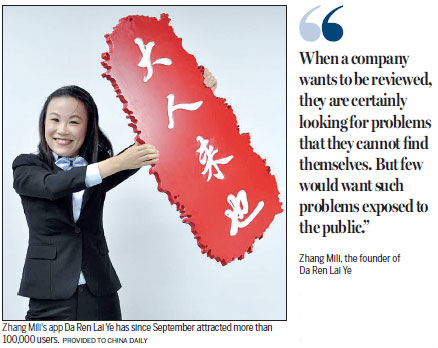Shanghai entrepreneur amasses a secret army of critics
The diner sitting beside the sizzling hotpot at Hai Di Lao, one of China's most popular restaurant chains, looks just like any other patron.
But take a closer look and one would realize that this person is armed with a pen, notebook and questionnaire, items that betray his real identity - an anonymous critic who is paid to review the restaurant, from its food quality to service efficiency to cleanliness of its tableware.
More than 70 years after the idea of employing mysterious shoppers and diners was introduced in the US and later used extensively by market research companies, 34-year-old Shanghai native Zhang Mili believes that it is about time such a concept gains traction in China.
In September, Zhang's Huami Company launched the mobile app Da Ren Lai Ye, which means "Here Comes the Excellency", a platform that allows anyone to become a food or shopping critic.
Da Ren Lai Ye has since been warmly welcomed by companies that used to commission research agencies to conduct market surveys as it is at least 50 percent cheaper to use, according to Zhang. She added that the app has also created a bond between customers and businesses as the former has now become involved in the management of the company he or she is evaluating.
"In this era of the sharing economy, people are not only sharing cars, apartments or wardrobes. We believe there is also a substantial number of people who would like to share the responsibilities of not only running a restaurant but also keeping an eye on food safety problems," explained Zhang about her motivation to create the application.
Zhang isn't the first person in China to come up with such a service. Zero Power Intelligence was one of the first companies in China to do so, but it is slightly different from Da Ren Lai Ye in that it specially trains people to produce professional reviews. The company has since its establishment a decade ago trained 1,500 people who review businesses in 85 percent of China's major cities.
Da Ren Lai Ye sets no such requirements for its reviewers as Zhang believes that companies just want to know basic information, such as the state of cleanliness and the quality of service, instead of having to go through long reports filled with research jargon. She believes that everyone is more than capable of making such assessments.
For every task completed, critics get to earn between 50 ($7.24) and 280 yuan, depending on the complexity of the task. Zhang said that this relatively low cost of hiring critics means that a greater number of people get to review a restaurant, which translates to a more comprehensive and accurate assessment.
In a bid to ensure transparency and accountability, users of the app have to provide their personal and bank account details when they sign up.
There is no lack of independent consumer reviews or ratings platforms in China. Dianping.com, which last year become the country's largest player in the industry following its merger with Meituan, now claims to have more than 200 million monthly active users from 250 cities nationwide, according to official statistics.
However, Zhang said that the drawback of such sites is that the evaluations are public. In contrast, the reviews by Da Ren Lai Ye are for clients' eyes only.
"When a company wants to be reviewed, they are certainly looking for problems that they cannot find themselves. But few would want such problems exposed to the public. That's the problem with rating websites," said Zhang.
Though the application has only been around for a few months, Da Ren Lai Ye has already managed to attract more than 100,000 users and secure contracts to review the 750 Burger King outlets in China and hot pot chain Hai Di Lao.
Da Ren Lai Ye also counts Singaporean bakery chain Bread Talk as one of its high profile clients. The company had during the Mid-Autumn Festival in September commissioned Zhang to make sure all of the mooncakes sold at its thousands of outlets across the country were up to standards - local food franchisers have been known to at times use cheaper products to boost profitability.
"Previously, we set aside a budget of 200,000 yuan to fly our regional manager everywhere during the mooncake season. But this year, we achieved the same goal using less than 10 percent of that amount by having users on the app check on our behalf," said Fang Zhi, general manager of the franchising department at Bread Talk.
Last week, Zhang's app received its first contract from the Food and Drug Administration of a district government in Shanghai. According to the contract, more than 2,000 restaurants and eateries in the city's Songjiang district will be scrutinized by the app's users.
Looking ahead, Zhang's biggest challenge is to get the thousands of mysterious diners to be more committed to being an anonymous critic.
"As a startup business, we cannot reject or blacklist users too easily. Sometimes we need to work with client companies to develop the survey questions in a more quirky way so that the critics don't lose their patience," she said.
Chu Dong, vice secretary-general of the China Chain Store and Franchise Association, commented that such an app could be the answer to the country's problems with food safety.
"There is an imbalance between two ends: the government's efforts are limited, while the food providers are numerous. Having so many consumers involved in the quality check process might be a solution," said Chu.
xujunqian@chinadaily.com.cn



















